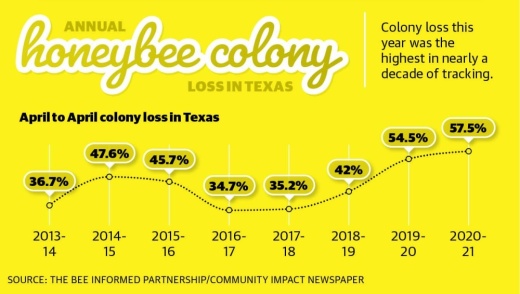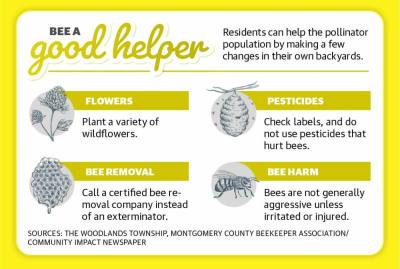However, an official in The Woodlands Township said efforts are underway to recover local pollinator populations.
Lisa Miller, a backyard beekeeper in The Woodlands and a former board member of the Montgomery County Beekeeper Association, said her backyard hives suffered from the freeze.
“The weather this year was really hard on bees,” Miller said. “Talking to local beekeepers, some of them lost 25% to 50% of their hives from that freeze. And the other problem after the freeze was that it affected a lot of the spring flowering plants.”
The Bee Informed Partnership, a nonprofit organization that works alongside beekeepers to improve honey bee colony health and survivorship across the United States, released preliminary data detailing the effect the 2020-21 winter had on bee colonies in Texas.
Between Oct. 1 and April 1, an estimated 37.6% of managed colonies in Texas were lost, according to the data. Texas winter colony loss was 5.4% higher than the average winter loss for the United States and was 16.9% higher than the Texas winter colony loss of 2019.
Ed Erwin, a certified master beekeeper who owns and operates the 15 hives located at The Woodlands Resort, said his hives were not affected by the winter storms as much as they were affected by the lack of flowers with nectar and pollen.
“We had a lot of rain in May,” Erwin said. “And anytime it rains, it literally washes the nectar and pollen out of the flower.”
Miller said typically The Woodlands has an ideal habitat for native bees and honeybees given the amount of vegetation; however, pesticide use in the community poses the largest long-term threat to the local pollinator population.
“There is an advantage because there’s more nectar available and more pollen available in an area like ours,” Miller said. “But we also have more pesticides. ... Bees use those plants. And that can hurt the bee population.”
Erwin said some pesticide use causes a variety of problems for bees, especially in The Woodlands as there are a lot of yards, golf courses and decorative flower beds.
John Geiger, environmental services manager for The Woodlands Township, said the township encourages residents to avoid using pesticides.“
Most pesticides, even if they say ‘natural’ on the label, are broad-spectrum chemicals that affect all insects, good and bad,” Geiger said. “One of the best things you can do for pollinators and in turn the birds and other wildlife that depend on them is to avoid chemical use altogether in your landscape.”
Geiger said the township believes community education is the best way to help limit pesticide use. Geiger said The Woodlands received the Innovation in Conservation Award from the National Recreation and Park Association in 2020.
The township’s environmental services department makes additional efforts in community education, such as encouraging the community to help the pollinator population by participating in the township program called Plant for Pollinators, in which community members are encouraged to plant gardens while keeping the needs of pollinators in mind.
“The township dedicates funds annually to raise public awareness of the issue and increase pollinator habitat throughout The Woodlands,” Geiger said. “We’re seeing a number of positive outcomes from this effort, including ever-increasing demand from residents for pollinator-related information and resources, and in just the past two years, over 13 acres of pollinator habitat have been established on private and public land.”






